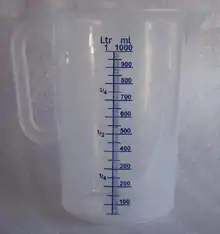Cubic centimetre
| Cubic centimetre | |
|---|---|
 A measuring cup holding 1000 cubic centimetres, that is one litre (1 L) or 1000 millilitres (1000 mL) | |
| General information | |
| Unit system | Prefixed SI derived unit |
| Unit of | Volume |
| Symbol | cm3 or cc, ccm |
| Conversions | |
| 1 cm3 in ... | ... is equal to ... |
| SI base units | 1.0×10−6 m3 |
| Imperial and U.S. customary | 0.06102374 in3 |

A cubic centimetre (or cubic centimeter in US English) (SI unit symbol: cm3; non-SI abbreviations: cc and ccm) is a commonly used unit of volume that corresponds to the volume of a cube that measures 1 cm × 1 cm × 1 cm. One cubic centimetre corresponds to a volume of one millilitre. The mass of one cubic centimetre of water at 3.98 °C (the temperature at which it attains its maximum density) is almost equal to one gram.

In internal combustion engines, "cc" refers to the total volume of its engine displacement in cubic centimetres. The displacement can be calculated using the formula
where d is engine displacement, b is the bore of the cylinders, s is length of the stroke and n is the number of cylinders.
Conversions
- 1 millilitre = 1 cm3
- 1 litre = 1000 cm3
- 1 cubic inch = 16.38706 cm3.
Unicode character
The "cubic centimetre" symbol is encoded by Unicode at code point U+33A4 ㎤ SQUARE CM CUBED.[1]
See also
- Cubic inch
References
- ↑ Unicode Consortium (2019). "The Unicode Standard 12.0 – CJK Compatibility ❰ Range: 3300—33FF ❱" (PDF). Unicode.org. Retrieved May 24, 2019.